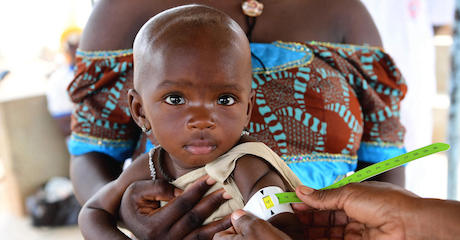Disruptions in global markets caused by the war in Ukraine have sent food prices soaring, heightening the risks of malnutrition for millions of children in countries that rely on food imports.
Price hikes for wheat and other commodities coupled with low purchasing power among impoverished families is exacerbating food insecurity in the Middle East and North Africa and in other countries hit hard hit by two long years of the COVID-19 pandemic and related economic impacts.
The situation in the Horn of Africa — already facing the worst drought in 40 years — is swiftly deteriorating, UNICEF reports. Families are taking desperate measures to survive. Thousands are leaving their homes in search of food, water and pasture. The risks faced by women and girls – including gender-based violence and death during childbirth – have risen sharply since the drought began.
Child malnutrition is already a chronic problem in Yemen, Syria, Lebanon and Sudan due to armed conflicts and other humanitarian crises. UNICEF estimates that little more than one-third of young children in MENA (36 percent) consume a diet required for healthy development. Nearly 1 in 5 children is stunted, which means they are too short for their age, and could suffer severe irreversible physical and cognitive damage.
With the threat of large-scale loss of life rising each day, UNICEF is appealing for immediate support to ramp up nutrition support for the most vulnerable. Working with partners, UNICEF is looking to consolidate ongoing efforts to urgently deliver and scale up prevention, early detection and lifesaving treatment of malnutrition and address the needs of millions of children and women. “This is critical to prevent a massive malnutrition crisis,” said Adele Khodr, UNICEF MENA regional director.
Preventive nutrition services include micronutrient supplements, growth monitoring and counselling and support on breastfeeding and age-appropriate complementary feeding. These and other UNICEF nutrition programs reach millions of children annually.
“We stand ready to facilitate the revamping of the nutrition response in the region to further strengthen links with agriculture, social protection, education and water and sanitation sectors to reach more children in need.”
Support UNICEF’s emergency action to address this once-in-a generation humanitarian crisis. Donate today.
Top photo: A mother with her baby at a UNICEF-supported health center in Fada, in eastern Burkina Faso where children are screened for malnutrition and vaccinated. Burkina Faso is one of many countries in Africa that is still reeling from the impacts of COVID-19 as well as increasing food insecurity exacerbated by the effects of the war in Ukraine on supply chains and global markets. UNICEF projects that as many as 700,000 children in Burkina Faso will suffer from wasting in 2022, of whom 180,000 will suffer from severe wasting. © UNICEF/UN0487651/Dejongh
